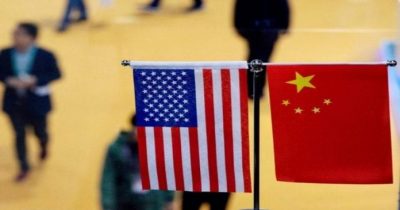One of the Great Ironies: As China Grows Richer, It Is Growing Further Apart from the US

All Global Research articles can be read in 51 languages by activating the “Translate Website” drop down menu on the top banner of our home page (Desktop version).
***
In calmer times, when there is less talk of trade disputes, tariffs, human rights abuses, it will be noted as one of history’s great ironies that as the economic gap between the United States and China narrowed the ideological chasm widened. The spiral in relations shows no sign of easing.
Cold war 2? The sequel. Deep voiceover declares….This time it’s more evenly matched. No. There will be no cold war, at least not yet. But a military stand-off, once considered beyond the borders of the imagination, is not difficult to envisage. Harsh verbal exchanges, real and angry disputes over territory and trade, have replaced the optimism of yesteryear. Remember Chimerica? That word that was meant to symbolize unofficial economic union, with China producing and America buying. Who now dares utter it?
Beijing is not blameless but when it complains that its point of view is being ignored it does at least have a case worth listening to. From the perspective of the leadership compound just off Tiananmen square, there is just the slightest odor of McCarthyism. Everything China does, it seems, is suspicious, warranting the greatest skepticism.
The West, unpopular as it is to say it, has reasons to be grateful to China. In 2008, the country’s cabinet, the State Council when it still had influence and power before being neutered by President Xi Jinping, approved a stimulus plan to invest about US$600 billion in infrastructure and social welfare facilities in 2009 and 2010. This was to be funded mainly by bank loans. China’s central bank lifted almost all restrictions on commercial bank lending to support the real economy. In other words it turned the taps on. This provided a Chinese shot in the arm to an exhausted and overleveraged Western economy.
China has emerged economically and is emerging militarily, at least regionally. Under Xi, it has shifted its gaze. Few in the West paid attention or wanted to. In the West, China was considered the big spender. Produce and China will buy seemed to be the mantra. China, not surprisingly sees itself differently. No longer of the Great Wall, constructed to keep foreigners out, China is now of the great wave, with a navy to deter invasion and secure the three seas, the San Hai: the South China, East China and Yellow seas.
The century of humiliation up to 1949, as every Chinese school child learns, emerged from the sea. Infamously, in the final years of the Qing Dynasty, the Empress Dowager diverted funds earmarked for naval modernization to construct a new Summer Palace. This reallocation was blamed for China’s defeat in the 1894-95 war with Japan. The British had already arrived by sea as had the French and Germans. China had learnt one invaluable lesson; the sea is treacherous.
Securing the sea, secures China and, today, the ruling party. Maritime freedom of navigation? To China, it’s cover for a front door that has been kicked in too many times. Militarizing the South China Sea plays well domestically, and is not seriously challenged internationally. It does not make it right. It does make it realpolitik. A large piece of the planet’s maritime real estate has been taken over by China. There is no mistaking the fact that it is a blow to the West. Beijing understood it can act and deal with the relatively insubstantial consequences. The Monroe Doctrine in the East.
War, like politics, is local. Almost overlooked, out of convenience or otherwise, in just over two decades the People’s Liberation Army (PLA) has built up one of the strongest navies in the world. What makes it even more formidable is that in its near waters it can rely on shore-based missiles. In sheer numbers, the PLA navy now has the world’s biggest fleet and is expanding and growing faster than any other major navy.
A defense report to the US Congress during the Trump administration did not mince its words. In a war with China over Taiwan, “Americans could face a decisive military defeat’’.
True, US ships do sail, frequently, through the Taiwan Strait. It has occurred since Joe Biden took the oath of office. But it is important to realize what is not happening rather than what is. Each passage involved destroyers. Enough to send a message. But nowhere near enough to send a warning. That would involve aircraft carriers. No American carrier has navigated the Taiwan Strait since Obama was first sworn in.
Globally, the US remains the undisputed champion of the high seas. China’s fleet has more ships, but the US has more powerful ones.
But that’s not the point. In waters close to China, the PLA navy enjoys at least parity and probable supremacy.
The Chinese mainland can serve as a vast, unsinkable aircraft carrier. China’s warships would be close to logistical support as well as the firepower of land-based missiles and strike aircraft.
But to what end? Is securing the near seas correcting a legacy of history or the prelude to an action, the invasion of Taiwan, that, at the very least, would set back relations between China and the West for generations and raises the real possibility of conflict?
It is of increasingly little comfort to suggest that this, surely, is beyond the borders of the imagination.
*
Note to readers: please click the share buttons above or below. Forward this article to your email lists. Crosspost on your blog site, internet forums. etc.
Tom Clifford is a frequent contributor to Global Research.
Featured image is from Global Village Space

